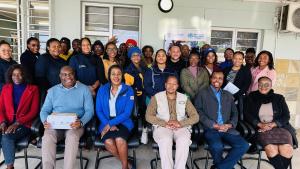WHO collaborates with MoHSS in the fight against cervical cancer in Omaheke Region
On 02 August 2024, the World Health Organization (WHO) in partnership with the Government of Japan donated cervical cancer screening instruments to the Ministry of Health and Social Services (MoHSS) in the Omaheke region. The donation was made under the Japan-funded project titled Increasing Access to Quality Nutrition and Protection Services for Vulnerable Populations including women and children, which aims to increase access to nutrition interventions to prevent and manage malnutrition among women and children.
“As WHO, we would like to express our gratitude to the Government of Japan for the financial support to procure the screening instruments being donated to the Ministry today,” acknowledged Dr Temptation Chigova, the Maternal and Child Health officer at WHO Namibia as she delivered remarks on behalf of WHO representative Dr Richard Banda. Dr Chigova further reiterated that WHO is committed to support MoHSS to protect the health of women and reduce cervical cancer mortality in the country.
The donated instruments will be used during African Child Vaccination Week from 05 – 09 August 2024, where screening for cervical cancer is being integrated. The donation aims to support the ministry’s effort to eliminate cervical cancer and achieve the 90-70-90 elimination targets. Currently, it is estimated that every year, 375 women are diagnosed with cervical cancer in Namibia and 214 die from the disease. Cervical cancer is the 2nd most common female cancer in Namibia and is avoidable through screening, HPV vaccination and treatment of those diagnosed.
Accepting the donation, Omaheke Regional Health Director Mr Jeremiah Shikulo expressed gratitude to WHO saying that the donation came at an opportune time when the region is about to conduct the African Child Vaccination Week. “The instruments will allow us to reach the targeted population in the Omaheke region and I would like to ensure WHO that the instruments we received will be used for the intended purpose of screening, detecting and treating cervical cancer,” he added.
The instruments comprise of 200 vaginal speculums and 200 Visual Inspection with Acetic acid (VIA) packs, and screen points have been identified at Epako, Aminius and Leonardville clinics, Otjinene health center and Epako community center.



